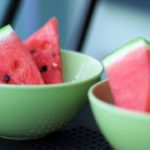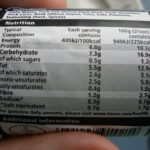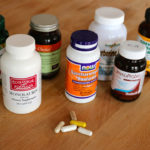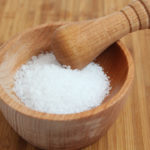
Honey has multiple health benefits including weight loss, good for reducing cough, gastrointestinal, skin care and burn care
भाषा बदलें: हिंदी में

Honey has multiple health benefits including weight loss, good for reducing cough, gastrointestinal, skin care and burn care
 A human body contains from 55% to 77% water depending on body size. Keeping our body hydrated is very important for our physical and mental behavior. We should drink enough to balance water losses. To function properly, the body requires between one and seven liters of water per day to avoid dehydration; the precise amount depends on the level of Read More …
A human body contains from 55% to 77% water depending on body size. Keeping our body hydrated is very important for our physical and mental behavior. We should drink enough to balance water losses. To function properly, the body requires between one and seven liters of water per day to avoid dehydration; the precise amount depends on the level of Read More …
 We need oxygen to stay alive but our body generates reactive-oxygen as a by-product of the body’s stress response. These are also called free-radicals and they can damage healthy cells. These free-radicals are also produced from exposure to smoke, alcohol, heavy metals (through air and water), and even from heavy exposure to sun. Anti-oxidants neutralize the effect of free radicals. Read More …
We need oxygen to stay alive but our body generates reactive-oxygen as a by-product of the body’s stress response. These are also called free-radicals and they can damage healthy cells. These free-radicals are also produced from exposure to smoke, alcohol, heavy metals (through air and water), and even from heavy exposure to sun. Anti-oxidants neutralize the effect of free radicals. Read More …
 Food labels or nutrition labels are read by the consumers for various reasons. Few people compare the brands. The terms used on food label are difficult to understand and they are printed really very small which makes very difficult to read with naked eye are the problems faced by the consumers. Nutritional information will be understood people by TV advertisements, Read More …
Food labels or nutrition labels are read by the consumers for various reasons. Few people compare the brands. The terms used on food label are difficult to understand and they are printed really very small which makes very difficult to read with naked eye are the problems faced by the consumers. Nutritional information will be understood people by TV advertisements, Read More …
 Bacteria is good for health. Though it is tough to understand but it is true. We use antibiotics, antibacterial soaps to kill microorganisms but right bacteria at a right place is proved to be beneficial. We usually think bacteria as something which is not good for health and also causes diseases. Our body (mainly gut) is full of bacteria which Read More …
Bacteria is good for health. Though it is tough to understand but it is true. We use antibiotics, antibacterial soaps to kill microorganisms but right bacteria at a right place is proved to be beneficial. We usually think bacteria as something which is not good for health and also causes diseases. Our body (mainly gut) is full of bacteria which Read More …
 What is salt? It is a crystalline compound sodium chloride (NaCl) that consists of sodium chloride, is abundant in nature, and is used especially to season or preserve food or in industry. It is also known as common salt. Salt and sodium Sodium is a component of salt but they are not the same. Salt contains 40% sodium and 60% Read More …
What is salt? It is a crystalline compound sodium chloride (NaCl) that consists of sodium chloride, is abundant in nature, and is used especially to season or preserve food or in industry. It is also known as common salt. Salt and sodium Sodium is a component of salt but they are not the same. Salt contains 40% sodium and 60% Read More …
 This article is for children above 2 years of age. For less than 2 years of age, see the article on weaning. You may also want to see articles on adult nutrition and old-age nutrition. Introduction Children at this age can have the same food as that prepared for the rest of the family. They should have three meals a Read More …
This article is for children above 2 years of age. For less than 2 years of age, see the article on weaning. You may also want to see articles on adult nutrition and old-age nutrition. Introduction Children at this age can have the same food as that prepared for the rest of the family. They should have three meals a Read More …
 Old age catches up with everyone eventually. Degenerative diseases of the heart & blood-vessels, bones and joints take over with age. Physical activity & exercise is very useful to counter these. Here some of the common things to keep in mind: Old age brings about a reduction in body’s metabolic rate, digestion, kidney-function etc. This also has a direct impact Read More …
Old age catches up with everyone eventually. Degenerative diseases of the heart & blood-vessels, bones and joints take over with age. Physical activity & exercise is very useful to counter these. Here some of the common things to keep in mind: Old age brings about a reduction in body’s metabolic rate, digestion, kidney-function etc. This also has a direct impact Read More …
 Overall Dietary Needs People are quite conscious about their diet. But they may not be aware of the proportion and quantity of various macro- and micro-nutrients. Major nutrients are carbohydrates, fats and proteins. Micro-nutrients are vitamins, minerals and antioxidants. The picture below shows the ideal break-up for calorie-intake in a normal diet. Persons leading sedentary lifestyle invariably end up taking Read More …
Overall Dietary Needs People are quite conscious about their diet. But they may not be aware of the proportion and quantity of various macro- and micro-nutrients. Major nutrients are carbohydrates, fats and proteins. Micro-nutrients are vitamins, minerals and antioxidants. The picture below shows the ideal break-up for calorie-intake in a normal diet. Persons leading sedentary lifestyle invariably end up taking Read More …
 Last time I wrote about exercise; I hope you were benefited to some extent. Today I want tell you about nutritious food. Let us speak first about fruits and vegetables. They are health promoting as well as pleasure giving. WHO recommends 5 servings of fruits and vegetable every day. Each serving should be of 80 grams, three from vegetables and Read More …
Last time I wrote about exercise; I hope you were benefited to some extent. Today I want tell you about nutritious food. Let us speak first about fruits and vegetables. They are health promoting as well as pleasure giving. WHO recommends 5 servings of fruits and vegetable every day. Each serving should be of 80 grams, three from vegetables and Read More …